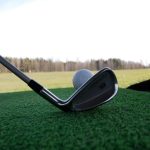Golf clubs are the essential tools for golfers of all levels. Understanding the different types of clubs, their performance characteristics, and how to select the right ones for your game can significantly improve your on-course performance and enjoyment.
**Types of Golf Clubs**
Golf clubs are divided into several categories based on their design, purpose, and loft angle. The main types include:
* **Woods:** Long-distance clubs with a low loft angle, used for tee shots and approach shots from the fairway.
* **Irons:** Medium-distance clubs with a higher loft angle, used for approaching the green and escaping from rough.
* **Hybrids:** A combination of woods and irons, offering a blend of distance and accuracy.
* **Wedges:** Specialized clubs with a high loft angle, used for short-distance shots around the green and getting out of bunkers.
* **Putters:** Clubs specifically designed for rolling the ball on the putting green.
**Club Performance Characteristics**
The performance of a golf club is determined by several factors, including:
* **Loft:** The angle of the clubface, which determines the trajectory and distance of the shot.
* **Shaft:** The length, weight, and flexibility of the shaft, which affects the swing speed and accuracy.
* **Head:** The size, shape, and material of the clubhead, which influences distance, accuracy, and forgiveness.
**Club Selection**
Choosing the right golf clubs for your game depends on your swing characteristics, skill level, and course conditions. Here are some guidelines:
* **Iron sets:** Choose irons with lofts that complement your swing speed and provide the necessary distance gaps.
* **Woods:** Select woods with appropriate lofts for your desired distance and trajectory.
* **Hybrids:** Hybrids offer a versatile option for players who struggle with long irons or prefer more forgiveness.
* **Wedges:** Choose wedges with lofts that cover the distances needed for various shots around the green.
* **Putters:** Experiment with different putter designs and find one that suits your putting style and helps you make consistent strokes.
**Fitting Considerations**
For optimal performance, it's recommended to get fitted for golf clubs by a professional club fitter. They will assess your swing and physical characteristics to recommend clubs with the optimal specifications for your game.
**Maintenance**
To ensure optimal performance and longevity, it's essential to properly maintain your golf clubs. This includes cleaning the clubheads and shafts regularly, checking the grip for wear, and storing the clubs in a dry and protected environment.
**Conclusion**
Golf clubs are a crucial aspect of the game, and understanding the different types, performance characteristics, and selection criteria can help you optimize your performance and enjoy the game to the fullest. By choosing clubs that match your swing and course conditions, you can improve your accuracy, distance, and overall scoring potential.

